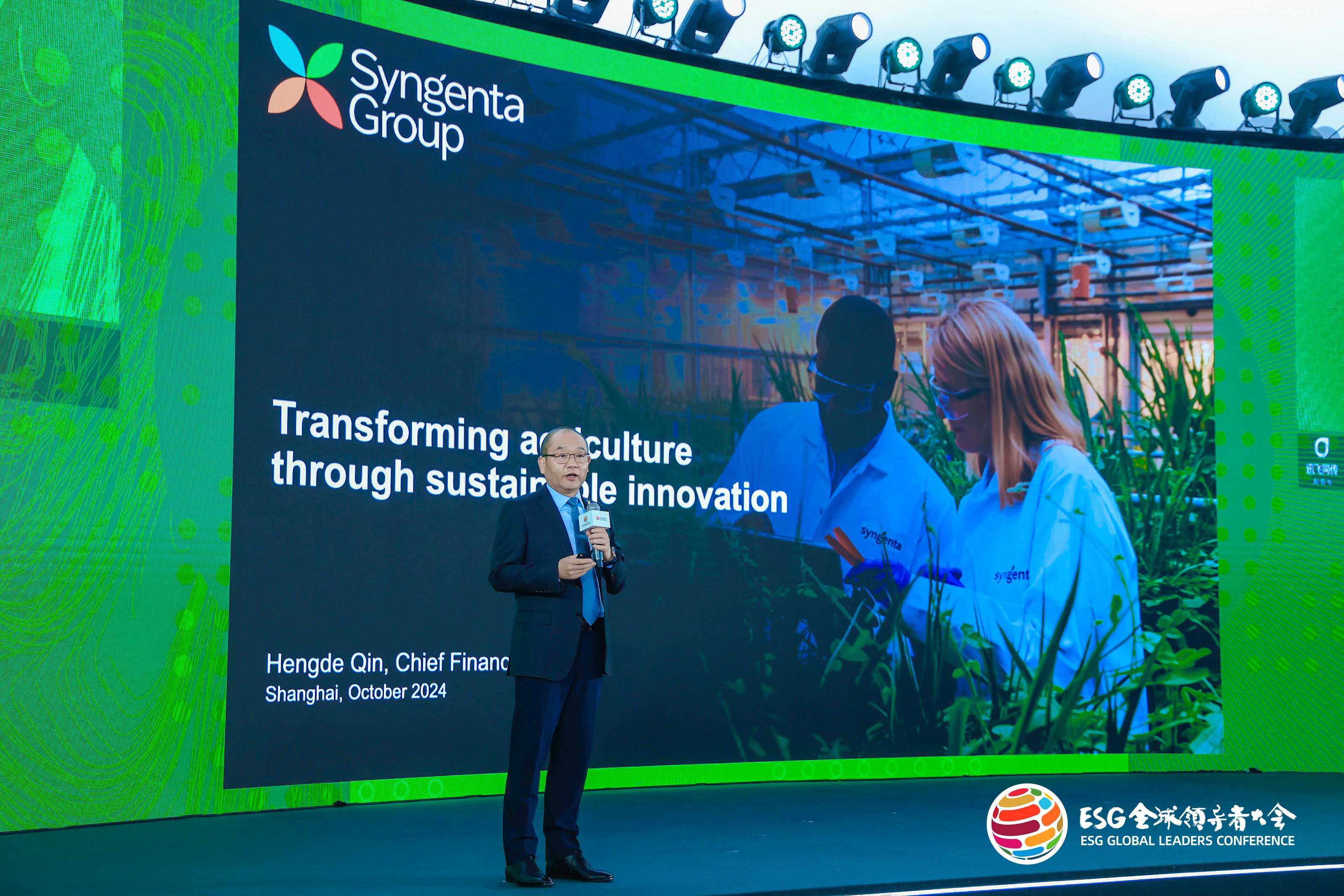 Innovation Is Key to Global Food Security as Challenges Mount, Syngenta Group’s CFO Says
Innovation Is Key to Global Food Security as Challenges Mount, Syngenta Group’s CFO Says(Yicai) Oct.30 -- Syngenta Group is doubling down on tech innovation and cross-sector tie-ups to transform agriculture amid rising global food security concerns, climate change impact, and geopolitical tensions, the agrochemical and seed giant’s chief financial officer told Yicai.
“Food security is the biggest challenge for humanity, no matter borders or geographies,” Qin Hengde, who is also a member of the board of directors, said in a recent interview at Syngenta’s Shanghai office. “This is the common challenge for all.”
The world needs to produce 60 percent more food from 2010 as the global population is expected to reach 9.7 billion by 2050, Qin said, citing figures from the United Nation’s Food and Agriculture Organization.
“The agricultural sector stands at a critical juncture,” he noted. “Our role is to enable this transformation through technology while ensuring that farmers remain profitable and sustainable.”
Against the backdrop of complex US-China relations, Syngenta -- a Swiss-based business acquired by China National Chemical in 2017 for USD43 billion -- is positioning itself as a crucial bridge between the world's two biggest agricultural markers, according to Qin.
“We strongly believe that collaboration between the United States and China is crucial for addressing food security and climate change, two of the most pressing issues facing humanity,” Qin said.
“When we consider the US-China relationship, it's clear that China is the largest market for agricultural products, while the US is the biggest exporter,” he pointed out. “We’re complementary to each other, rather than in conflict. That’s why collaboration is essential.”
While acknowledging the complex geopolitical environment, Syngenta's strategy focuses on maintaining operational stability through its diversified global presence, with business in more than 100 countries. “Through our innovations and advocacy, we can focus on priorities like food security and climate change,” Qin said.
Innovation at the Core
Syngenta is betting big on innovation to deal with the global food security challenge brought about by extreme weather, climate change, and geopolitical tensions.
With 6,500 scientists in over 150 research and development hubs worldwide, Syngenta, as the world leader in crop protection, biologicals, and seeds technologies, invests nearly USD2 billion a year to develop technologies that helps farmers to boost yields, reduce chemical inputs such as fertilizers and pesticides, and cut emissions, while improving soil health and biodiversity.
“We’re committed to innovation as a key solution,” Qin pointed out. “Our researchers focus on helping farmers access the latest products to better cope with extreme weather and diseases, stabilize yields, and reduce environmental impact.”
Syngenta has structured its innovation strategy across three time horizons. In the short term, it focuses on new active ingredients and biobreeding innovations to help farmers steady yields and reduce chemical usage. Mid-term priorities include biological tech to enhance crop resilience, while long-term the focus is on digitalization and artificial intelligence.
Digital Revolution
“We recognize data as a new driver,” Qin said, highlighting how digital and AI technologies are transforming agricultural innovation. The company has formed strategic partnerships with agtech startup Enko for big data analytics in crop protection and AI developer InstaDeep for applying large language models to bio-breeding innovation.
Syngenta's digital platform Cropwise now covers more than 100 million hectares of farmland across 25 countries, with the platform integrating data from multiple sources, including remote sensing satellites, drones, and soil sensors, to provide real-time advice to farmers.
In China, the company has developed the Modern Agriculture Platform, or MAP, providing integrated online and offline agricultural management services including precise seed selection, soil testing, and smart farming systems.
ESG Integration
Of the USD2 billion Syngenta invests annually to develop technologies that help farmers, USD700 million to USD800 million goes to each of crop protection and seeds research, with the rest directed to crop nutrition, digital agriculture, and other innovative domains, Qin said.
This year, the company began implementing its Portfolio Sustainability Framework, scalable and data-driven platform which guides its investment decision-making.
“The PSF provides crucial decision-making support for our innovation investments,” according to Qin. “We conduct thorough assessments of each product's economic benefits, carbon footprint, and environmental impact, assigning sustainability ratings that guide our investment decisions."
Syngenta has put into effect a number of successful sustainability initiatives, including a “low-carbon wheat practice” in China’s northeastern Shandong province and a partnership with BBB, Brazil’s largest bank, to restore degraded farmland. The Brazilian project has already brought back 200,000 hectares, as part of an ambitious goal to rehabilitate 100 million hectares.
“What we've discovered is particularly encouraging,” Qin said. “Products with stronger environmental credentials are consistently delivering higher profit margins, demonstrating that sustainability and profitability can go hand in hand.”
China’s New, Golden Era
Despite global economic headwinds, Syngenta remains bullish on China's agricultural sector. “This is going to be the new and golden era of Chinese agriculture,” Qin noted. “Chinese consumers are demanding higher-quality protein, which translates into increasing demand for premium food and agricultural products.”
The shift in consumer behavior has created substantial market opportunities, prompting the Syngenta to speed up investment in innovation in China.
“We’re highly motivated to invest in innovative technology here and grow our business robustly,” Qin pointed out. “China has emerged as one of the most vibrant sources for agricultural innovation, benefiting both domestic agricultural transformation and the global food supply chain.”
With operations in more than 100 countries, Syngenta leverages its unique position as a multinational concern to facilitate agricultural innovation exchange between China and global markets. “While China is one of the most important strategic focus, our global presence gives us a unique advantage,” Qin said.
“We serve as a bridge, introducing advanced global agricultural technologies to China while simultaneously leveraging Chinese innovations to enhance agricultural development worldwide,” he said.
Editor: Tom Litting